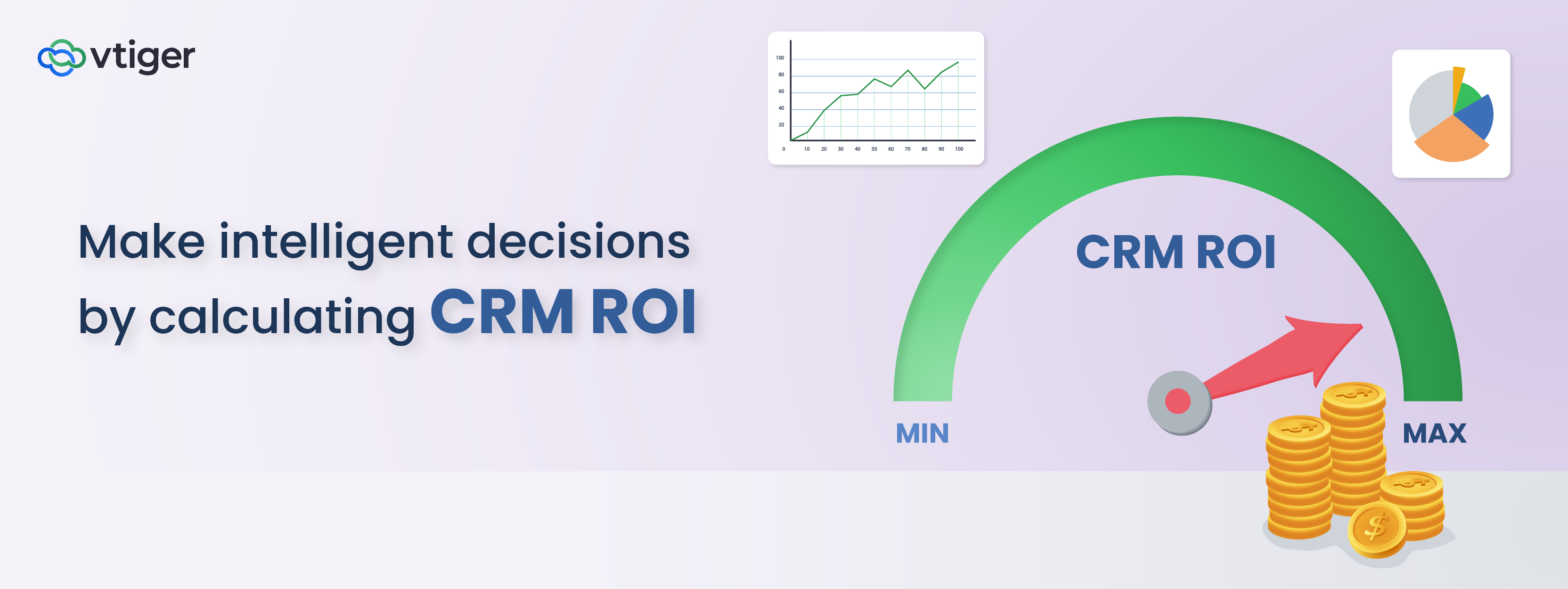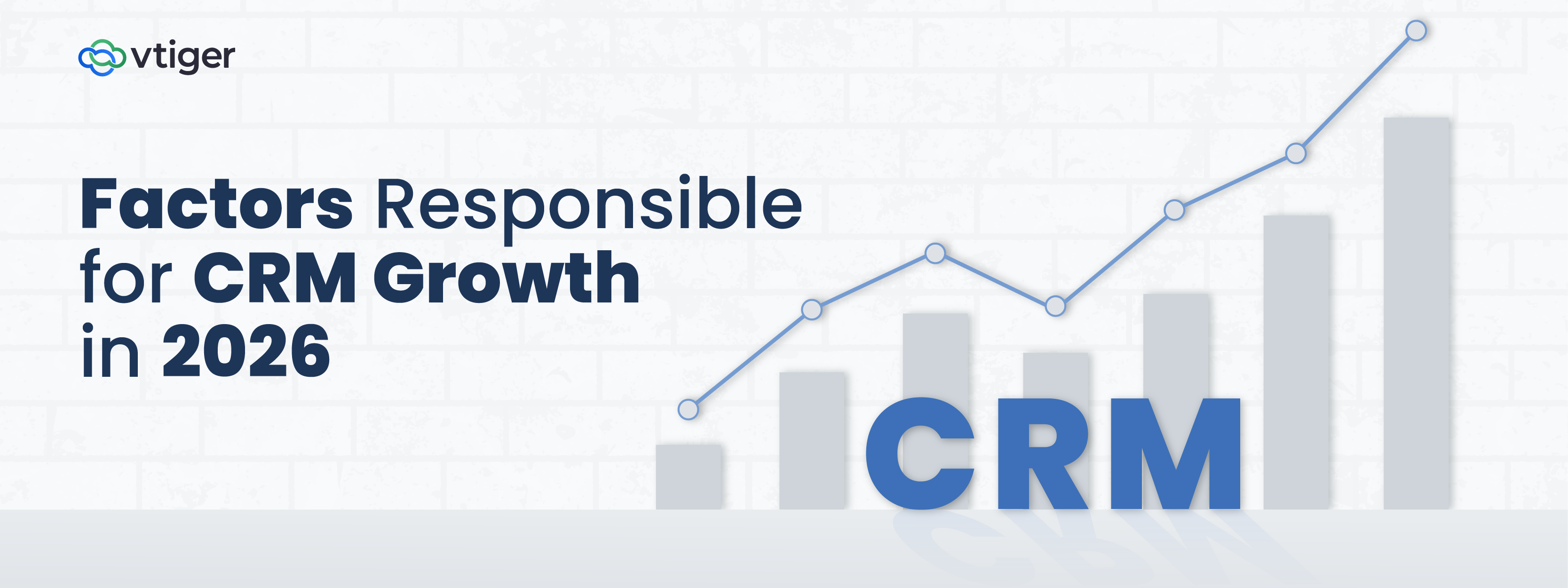Sarah, the founder of a mid-sized software company introduced a CRM application two years ago to boost sales efficiency and streamline customer interactions. Despite witnessing significant business growth, she found it challenging to quantify the success in financial terms.
What do you think is the ideal way to measure your CRM success? The solution lies in calculating the CRM Return on Investment (ROI).
To measure CRM ROI, you can use a CRM calculator, but are you familiar with the crucial metrics that should be monitored to estimate potential gains?
If not, let us delve into the fundamentals of CRM ROI, effective ways to track your CRM earnings, and so on.
Defining CRM ROI: Beyond Numbers
CRM ROI is a way to calculate how well your CRM performs for your business considering both financial and non-financial gains. This includes measurable benefits such as increased sales and cost savings, and less tangible ones like improved customer loyalty and productivity.
By calculating your returns, you will be able to evaluate the impact of your CRM on your business performance, spot the areas that need improvement, and increase profitability.
Here are key CRM ROI statistics that may be useful to you:

Now, it’s time to explore the key metrics for assessing your ROI.
What are the key performance indicators to track CRM ROI
Before delving into the core metrics, let us consider a real-world example that proves the power of tracking the right metrics.
Use Case: Tech Magic Solutions
Tech Magic Solutions, a B2B software organization was overwhelmed by the volume of data initially. Afterward, the leadership team decided to focus on a handful of key metrics aligned with their business goals.
Within 15 months of this targeted approach, Tech Magic Solutions saw remarkable growth:
- 35% reduction in sales cycle length.
- 30% increase in customer retention rate.
- 26% boost in sales team productivity.
- 17% decrease in customer acquisition costs.
By focusing on critical metrics, Tech Magic Solutions achieved a 300% ROI on their CRM investment within the first year, exceeding their initial projections. This underlines the importance of evaluating core metrics for your business.
Here are the essential metrics to track CRM ROI:
1) Sales Performance Metrics
It offers insights into your team’s effectiveness in converting leads and closing deals. You can track:
- Conversion Rates to see how many prospects become customers.
- Sales Cycle Length demonstrates how quickly deals are closed.
- Average Deal Size reflects the typical value of each sale.
Identify areas of improvement from these metrics in your sales process and formulate strategies to increase revenue.
2) Customer Retention Metrics
This metric helps you understand how well you are keeping your customers satisfied. You can track:
- Churn Rate which shows how many customers you are losing over a period of time.
- Net Promoter Score which measures customer satisfaction level and the likelihood of customers recommending your business to others.
These are essential for maintaining a stable customer base and discovering growth opportunities.
3) Productivity Metrics
This metric helps you measure how effectively you are utilizing the CRM system. You can track:
- The time saved on everyday tasks and how CRM is streamlining your business process.
- The number of customer interactions per agent (sales/support) helps you understand how well your team engages with the clients.
- The time taken by your team to follow up with prospects.
You can use these metrics to optimize your team’s performance and explore areas where CRM is adding the most value to your business.
4) Cost Reduction Metrics
This metric shows how your CRM is helping you to reduce day-to-day operational costs. You can track:
- Customer Acquisition which provides insights into how much you are spending to gain new customers.
- Marketing Campaign Effectiveness to evaluate the profits gained from your marketing efforts like running ads or launching campaigns.
- Support Ticket Resolution which indicates how quickly your support team is resolving customer issues.
These metrics help you quantify the financial benefits and explore areas where CRM is contributing to cost savings.
How to Measure CRM ROI
The traditional way of calculating CRM ROI follows a simple formula:
Return on Investment = Profit of Investment/Cost of Investment* 100
Let’s consider Sarah’s example.
Sarah will first calculate the Cost of Investment using factors like software implementation and other ongoing expenses. Next, she will quantify the profit generated from the CRM using factors like sales revenue, productivity, customer retention rate, etc.
Then she will apply the ROI formula by dividing the CRM profits by the total investment she made and multiplying it by 100 to get the percentage.
As you can see, this approach requires a significant amount of time. It demands data gathering and analyzing costs on revenue and productivity which can be time-consuming and prone to human error.
On the contrary, CRM ROI calculators streamline the evaluation process ensuring consistency and accuracy. These calculators come with pre-built industry benchmarks and best practices. Additionally, they allow users to easily change variables and check ROI projections.
Let me take this moment to introduce our Vtiger CRM ROI calculator. The ROI calculator in Vtiger offers a tailored approach for calculating your return on investment.
Users can provide information specific to their business such as:
- Average Revenue Per Deal.
- Approximate Cost to Company per Inside Sales Team Member per month.
- Increase in cross-sell and up-sell due to customer one-view, and more.
This way businesses can make data-driven decisions about CRM adoption or optimization.
The top 3 advantages of using a CRM ROI calculator are:
- Quick Estimation: CRM ROI calculators provide a fast and accurate forecast of potential returns.
- Customized Insights: Add data unique to your business needs and get personalized insights.
- 360-degree Analysis: These calculators consider more than just financial profits when calculating returns, such as productivity gains, customer satisfaction levels, and so on.
How to maximize CRM ROI for your business
To ensure your team is taking advantage of your CRM completely, consider the following strategies:
- Ensure your team is well-versed in the CRM’s functionalities and best practices.
- Maintain up-to-date customer data to make informed decisions.
- Connect your CRM with third-party applications to perform specific tasks.
- Monitor your CRM’s performance regularly
Are you curious to know how Vtiger ROI Calculator can impact your business?




